- Home
- Jane Lebak
Pickup Notes Page 2
Pickup Notes Read online
Page 2
The woman ended her tirade with, “And then she threw my money back at me!”
I struggled to speak but in the end could only shake my head.
With a lack of hurry familiar to anyone who’s ever worked for city government, Walt bent to pick up the bills and every last one of the coins. He counted it and handed back some change. Shaking, I put up the gate, and while he supervised, she flipped me off and pulled through.
When he turned to me, I almost expected he’d pat my hand the way my grandfather used to. “Full moon. All the crazies come out.” And with that, Walt headed back to the office.
I deposited the money in the register. A minivan pulled in, handed over the toll, and rolled out. As the radio played the final notes of Mozart’s G Minor symphony, Bach slumped, his dance ended. I glanced at the clock, wondering how much longer I could keep this up.
TWO
Our scene: a black-tie wedding at Manhattan’s University Club, a banquet hall with mile-high ceilings, two thousand pounds of crystal dangling over our heads, and sound-swallowing acoustics. Breathtaking, gorgeous, and home to the reception of many a blushing bride.
Tonight’s bride was blushing courtesy of the open bar.
“You have to play ‘Hotel California’!” She kept shouting her demand right into our first violinist’s face, and this time she added something that’s made me want to wrap a C string around my own neck too many times. “It’s my day!”
Her day. Well, her evening. Judging from the flush of her cheeks, tomorrow wasn’t going to be her morning, so she might as well live it up tonight.
Rational conversation hadn’t helped. Harrison had already protested four times that we couldn’t play it. That we hadn’t practiced it. That we had no sheet music for it. And had she failed to notice string quartets make classical music?
We’d stopped playing, but we were still entertaining the crowd. Gone were the clinks of silverware and the thrum of conversation. Who wouldn’t be fascinated by a three-sheets-to-the-wind bride and a baffled quartet with no guitars, no drums, and no singer? They probably thought it was the most outrageous thing that ever happened at a wedding, but they didn’t know about the time a chipmunk got into the church and hid beneath our client’s bridal gown.
Although come to think of it, the chipmunk wasn’t screaming that any high school garage band could have managed this very simple request. The chipmunk also hadn’t threatened to stop payment on the check.
I glanced at the cellist on my left, wearing a tuxedo now that he wasn’t driving a cab. Shock had replaced the mischief in his eyes.
The groom dragged over the emcee, shouting, “Make them do it!”
The emcee leaned closer to Harrison. “Can’t you try?”
Harrison hissed back, “Are you out of your mind?”
Ah, the permanent standoff. Harrison wasn’t going to play and the bride wasn’t going to back down and the emcee wasn’t going to stand up to her. That left us how many options? So I tucked my viola and bow against my side. Approaching the bride, I pitched my voice low like my instrument. “This is such a beautiful wedding. Let’s take a walk to the head table. You can show me the cake topper.”
The bride swung to glare at me, and her anger drew all the air out of the hall, leaving me unable to breathe. “Don’t you dare tell me what to do! If I want to hear about hotels and eagles, I’m going to have it!”
I stepped backward, only to have the bride grab the scroll of my viola. I yanked away, but she said, “Now play it!”
That’s when our second violinist took the floor. With her height enhanced by her floor-length sheath dress, Shreya raised her violin with authority.
Me? I authoritatively fled.
I had no idea what Shreya planned to do, but with her black hair loose to her waist, she would look pretty darned good doing it. And then, to my surprise, she played eight bars of the usually-done-on-guitar riff made famous by the Eagles.
Seeming too small for his tuxedo, Harrison whispered, “Oh, God.”
Hands clasped, the bride nodded: do it again.
Shreya laid bow to strings and repeated the riff, this time going all the way through. I detected subtle differences between the first and second attempts, but I didn’t think the bride could have, even if she’d been sober, nor that she’d have cared. Shreya was improvising, in other words. And just like that, we were flying without a net.
I caught Harrison’s eye. Did panic harmonize with horror? For all I knew, Harrison might have been the only one in America who’d never heard “Hotel California.” But we already had our heads in the guillotine, so I raised my viola. If Shreya could fashion a performance out of a drunken bride’s demand, surely I could pick up the key and fake it.
After all, the joke goes that in order to imitate a violist, you only need to hit a lot of wrong notes in the low register.
Once I started, Josh our cellist laid down rapid bass notes on my other side.
After Shreya ran through it a third time, she gave her head a good shake. Then clamping her violin between her chin and shoulder, she raised her left hand to yank off the black-haired wig, revealing a head of ultra-short blue hair.
The bride squealed as Shreya resumed playing, her hips never still, her violin so in motion that I couldn’t believe it stayed aloft. Partners, she and the violin fully inhabited the space of the music. Beneath the chandelier crystals were the bride all in white and Shreya all in black, the bride still and Shreya in motion, the bride alone but Shreya and her violin together.
God, she’s good. I scanned the guests to see if anyone else recognized the magic, but no. At setup, the events manager had said the bridal party arrived drunk to the ceremony, and most of the guests hadn’t taken long to follow suit.
The groom stood slack-jawed while several groomsmen cat-called, and that’s when the bride snatched the emcee’s mike so she could warble on about Califo-o-oornia. Rather than change key to follow her, Shreya kept repeating the riff. The videographer wore the world’s wickedest grin as he encouraged the bride to mug for the camera.
Ever our heroic leader, Harrison set his violin on the chair and laid his arm across the bride’s shoulders, guiding the mike toward himself. Finally. This was fun and all, but maybe he could stop this Titanic from sinking not only itself but our quartet’s career.
“Thank you very much!” He sounded enthusiastic rather than horrified, and it stopped her mid-lyric. He guided the mike free of her hands. “Let’s have some applause for our bride Melissa and her stunning performance!”
Stunning. Unintentional irony was not Harrison’s strong suit, but it got applause. Heaven help our reputation. Worse, if the bride woke up tomorrow and remembered any of this, that check would end up bouncing harder than a home run whacking the upper deck at Yankee Stadium.
Heart thrumming a staccato, I glanced sideways, and this time Josh caught my eye. He winked. I snickered.
Cocking her head, Shreya sauntered to her seat, flashing us a grin. It was as if she’d said, We’re a team. We might be a newish quartet, but it’d take more than one wasted bride to knock us to the ground.
Struggling to relax my shoulders enough to play, I looked to Harrison for our cue.
Only then did I see Harrison still standing with the mike, and what he held in his hand. Before I could react, he earned us the eternal enmity of Miss Manners and anyone else with good taste. “If anyone wants to buy a copy of our CD, it’s on sale tonight for fifteen dollars!”
By the time I turned on my computer the next morning, still pajamaed and sleepy-eyed, Harrison had sent ten messages.
I sighed as I walked away. The world had not yet, and still has not, produced enough coffee to cope with Harrison, but I’d give it a try.
While pouring my coffee, I glared sidelong at the computer, which should have blushed for allowing all those emails through. Once I read them, I risked learning our other clients had heard what went down and re-booked actual professional quartets. The longer I delayed, the
longer we were kind of like Schrödinger’s Cat (Schrödinger’s Quartet?,) neither dead nor alive.
What did I really want to do? I wanted my viola. If I could, I’d close my eyes, draw a mellow tone from my instrument, and then with the wood vibrating against my shoulder and jaw, play until I forgot the world.
The problem was, good as it would feel, I couldn’t hide from reality forever. And if I left Harrison to deal with things on his own, I’d hate the results.
I returned to the creaky wooden chair, tucked up my slippered feet in defense against my cold apartment, and wrapped my warm mug in my palms. Thus fortified, I read Harrison’s messages, all ten of them—all about the same lunatic notion.
My voice cracked. “Harrison, you idiot—what are you doing?”
Destroying us. Pretty much.
Whenever Harrison got an idea, he explored every iteration, the logistics, and the overall applications. And he documented it. Texts, phone, email. Whatever was closest, he’d grab that device to send his most current snippet of a thought. When he first floated the notion of a string quartet, I heard from him a hundred times in four days, roughly five times our contact the rest of the time we dated.
And now our fearless leader wanted to take Shreya’s solo from last night, weave it into something perfectly respectable by Mozart or Haydn, and turn it into a frankensong.
I couldn’t bear it. I hit reply and typed, “Tell me, when did you lose your mind?” but then deleted it. As soon as I sent it, he’d know I was awake and start phoning.
Last night delighted him, clearly, but it made me cringe. Shouldn’t someone of his background know you do not hawk CDs at a wedding? Have them available, yes. Advertise them: hell no. But Harrison had blown me off with, “We sold five, didn’t we?” and then launched into how we should transmute the sound of Shreya’s improv into cash.
I didn’t mind money. In fact, since absence makes the heart grow fonder, I was quite taken with it. But there were limits.
By the fifth email, I couldn’t stomach my coffee. I had less chance of stopping this than derailing a train with my bare hands. He meant to drive us into some weird hybrid genre, and then who’d hire us?
No, get calm. All wasn’t lost: Shreya hadn’t replied, and the scheme hinged on her. Maybe she’d tell him to take a flying leap.
In the middle were three messages that didn’t involve rock music. Josh had sent a reply to only me: “I don’t get it. Do you think Harrison’s excited?”
Finally, some sanity. I emailed back, “What tipped you off?”
After that, a joyous message that should have opened with a blare of trumpets, from a potential client who’d called three days ago. Subject line: Meeting. Body of the email: a bride and groom wanted to discuss their wedding. Today, at lunchtime. Harrison had replied, “Absolutely,” and then sent a separate email to me: would I mind coming? Yes, Harrison. I always go along with you.
Another client had sent a final playlist for a wedding in two months. In addition to the ubiquitous Pachelbel’s Canon in D Minor and the “Ave Maria,” she’d requested Beethoven’s Fifth Symphony.
I laughed out loud. Don’t get me wrong: I love it too, with those opening notes that have captivated everyone for two hundred years as the sound of Fate knocking at the door. (Da-da-da-DUMM!) But it was a symphony, for crying out loud. Had she failed to notice she’d hired a string quartet?
Harrison had CC’d me on his reply to her too. Good. Let him explain the difference between four string players and a symphony orchestra—except he’d approved the bride’s entire song list. Even Beethoven’s Fifth.
After blinking three times to make sure he hadn’t suggested we play a medley of songs from the Fifth Dimension (oh those “Wedding Bell Blues!”), I picked up the phone. Yes, there was voicemail. No, I didn’t listen. Harrison answered before it rang twice.
“Are you out of your mind?”
“Hi, Joey!” Was that raw, unrefined cheer I detected? It stood in counterpoint to my raw, unrefined shock. “Isn’t this the best? It’s going to get us a lot of attention.”
He was lucky we weren’t together in a locked room. “We’re playing Beethoven’s Fifth Symphony?”
My voice should have carried musical notation, like outraged-issimo.
His musical notation would have read, whatever. “Oh, that. Josh can arrange something.”
I said, “Can Josh arrange for an additional seventy-two musicians, because—”
“Anyone dumb enough to ask a string quartet to play a Beethoven symphony is going to be dumb enough to believe we’ve succeeded. We’ll lift the main theme and a few of the melody lines, pass them around for five minutes, and we’re good.”
I started pacing. Clearly further protest would fall on deaf ears.
“They don’t listen anyhow.” Harrison totally missed the irony. “It’s not as if half the guests will know what the full symphony sounds like. Maybe they’ve heard part of the first movement on Loony Toons. Da-da-da-DUMM.” Remember about Fate knocking at the door? Someone please keep it closed. “I’m not going to say no to a contracted client.”
I glanced at the Pay Later folder, which encouraged me to shut up and cash the check like a good girl.
Harrison said, “We do the “Ode To Joy” all the time, and that’s part of Beethoven’s Ninth, right? Right. Have you read my email about the fusion project?”
“Some.” Then my brain twigged to what he’d said, and my voice rose half an octave. “It’s a project?”
“Yeah! We can start by—”
“Wait!” I found myself by the door, one hand on the knob. It wasn’t as if I could flee, so I really must have been trying to lock out Fate. “You can’t just plunge forward! We’re a quartet—there are four of us!”
“Well, yeah.” He sounded amused. “That is kind of the point.”
“So you can’t drive us alone!” I went into my bedroom and grabbed the blankets off the unmade bed, tugging them tight. “We have to agree to this!”
“Of course we’ll all agree.” Harrison’s idea of informed consent: he informed, you consented. I smoothed out the comforter. He said, “Quit panicking and trust me for once.”
“But—”
“You didn’t believe me that the quartet would work out, and hasn’t it?” He paused for effect, and I straightened my pillow. “You need to start trusting me sometime before we get married.”
“I’m not marrying you, Harrison.” But my voice had keyed down a notch. An in-joke. We had a history. Maybe our quartet had a future too.
“Well, I wish you’d trust me anyway.” That was the first time he sounded concerned. “I want us to succeed just as much as you do. Okay?”
I wanted to believe him. I wanted it because I needed us to survive. “Okay.” I glanced out the bedroom window at another line of row houses. “For now. We’ll talk it out at practice.”
THREE
Only Strings was the smallest shop in Manhattan, the size of my grandparents’ kitchen. In a brownstone on a side street off Fifth Avenue, parallel rows of fluorescent bulbs illuminated wall-to-wall compartments of strings: only strings. Violin, viola, and cello strings. Harp strings. Piano strings. Harpsichord strings. Arvin didn’t stock kite string, maybe because he’d run out of compartments. Have you nurtured a lifelong desire to study the zither? Arvin could string it.
I was second in line. The first customer said, “Do you sell guitars?”
Arvin didn’t look up from his paper. “No, sir. We’re Only Strings.”
Before the rebuked customer realized he’d been dismissed, the phone shrilled. Arvin answered with, “Only Strings, may I help you?” A pause. “No, ma’am. We’re Only Strings.” He hung up.
I’d first met the owner when he delivered a lecture to my college music theory class. Our professor had introduced this brick-like man with thinning hair as an expert historian of stringed instruments, but instead, head barely clearing the podium, he delivered a ninety-five minute monologue about strings
: materials used for strings, a thousand instruments with strings, different methods of vibrating a string (striking, bowing, plucking) followed by the construction of strings, the manufacture and distribution of strings, and disadvantages of certain types of strings. He recited the favorite strings of every classical soloist since Ditters von Dittersdorf in the late 1700s. If he had index cards, he never referenced them. After fifteen minutes, as Arvin gave instructions on how they gutted sheep in sixteenth-century Italy, I snuck a look at the professor to find her gaping. And right then, I’d have followed Arvin anywhere.
At the end of the lecture, I broke three years of collegiate silence to ask two questions: did he have a business card, and what was his favorite music?
His reply? “I don’t really listen to music. I just love strings.”
As a bonus, his shop was five blocks from Harrison’s apartment, perfect for an early-morning stop.
My turn. I stepped to the counter. “I’d like a tuna melt on wheat bread with a thin slice of swiss cheese on either side, but not too much tuna.”
Arvin began saying, “No, ma’am—” before recognizing my face and busting up laughing. Looking away, he said, “Good grief, Joey, for a moment I thought you’d taken the prize for the dumbest customer of the hour. Corelli Alliance medium violas?”
“The usual.” The usual in two senses: at sixty bucks a pop, restringing the viola meant I’d dine on ramen noodles for a week.
He zeroed in on a drawer the size of a CD without needing to look at the packets. I handed over my credit card and tried not to notice the total, then shoved the receipt in my wallet for taxes. Most days, the credit card hung out in a Mozart CD case while Beethoven guarded my ATM card. In real life, either of those guys would have bankrupted me in a heartbeat, but walking around without a credit card kept me from impulse buys.
My nose wrinkled. “Have you also got a tire iron so I can beat sense into Harrison?”

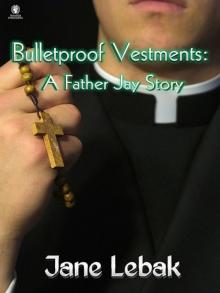 Bulletproof Vestments
Bulletproof Vestments The Wrong Enemy
The Wrong Enemy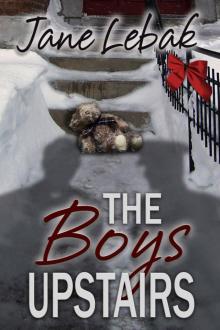 The Boys Upstairs (Father Jay Book 2)
The Boys Upstairs (Father Jay Book 2) Sacred Cups (Seven Archangels Book 2)
Sacred Cups (Seven Archangels Book 2)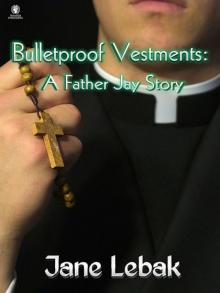 Bulletproof Vestments: A Father Jay Story
Bulletproof Vestments: A Father Jay Story An Arrow In Flight (Seven Archangels Book 1)
An Arrow In Flight (Seven Archangels Book 1)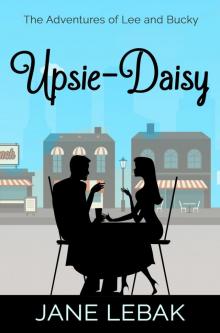 Upsie-Daisy
Upsie-Daisy Shattered Walls (Seven Archangels Book 3)
Shattered Walls (Seven Archangels Book 3)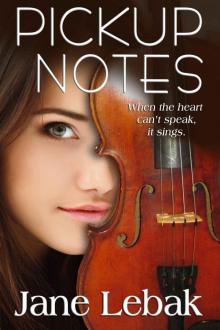 Pickup Notes
Pickup Notes